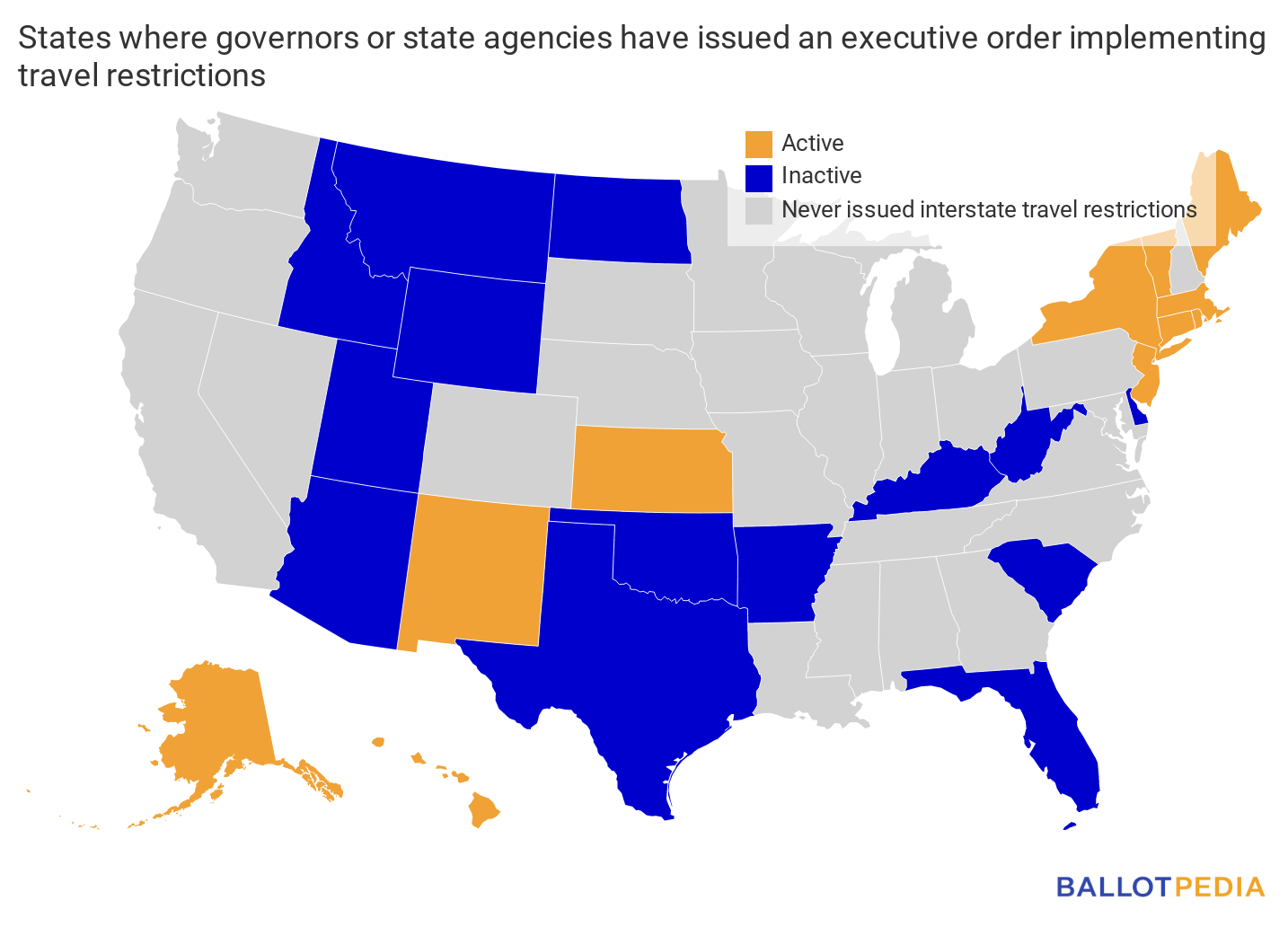| Welcome to Documenting America’s Path to Recovery, where we track the status of reopening in all 50 states.
Today we look at Connecticut’s decision to stay in Phase Two of reopening, Arkansas’s decision to start in-person instruction at schools on Aug. 24, travel restrictions, and much more. Want to know what happened yesterday? Click here.
The next 72 hours
What is changing in the next 72 hours?
Since our last edition
What is open in each state? For a continually updated article on reopening status in all 50 states, click here.
- Arizona (Republican trifecta): Officials from the Arizona Department of Health Services announced that each of the state’s 15 counties met at least one of the three benchmarks for reopening. Two counties—Apache and Yavapai—met all three, while Pima was the only county to meet just one.
- Connecticut (Democratic trifecta): Gov. Ned Lamont (D) announced the state would not proceed to Phase Three of reopening, which would allow for reopening bars and increasing dine-in capacity. Lamont also announced the state’s eviction moratorium would be extended through Oct. 1.
- Hawaii (Democratic trifecta): Gov. David Ige (D) signed an executive order extending the state’s coronavirus emergency period through Sept. 30.
- Idaho (Republican trifecta): Gov. Brad Little (R) announced the state will remain in Phase Four for at least two more weeks. Idaho entered Phase Four on June 13.
- Iowa (Republican trifecta): Gov. Kim Reynolds (R) announced that schools suffering storm damage from the Aug. 11 derecho will be allowed to use primarily remote learning to begin the 2020-2021 school year. Previously, only schools with a 15% coronavirus positivity rate or 10% absenteeism were allowed to primarily use remote learning.
- Michigan (divided government): On Aug. 21, the Michigan Court of Appeals ruled 2-1 that Gov. Gretchen Whitmer (D) was within her authority when she extended the state of emergency related to the coronavirus pandemic without the legislature’s approval. In their lawsuit, Republican lawmakers alleged Whitmer’s state of emergency order was unconstitutional.
- Ohio (Republican trifecta): On Aug. 20, Gov. Mike DeWine (R) said that senior centers and adult day centers can reopen with restrictions on Sept. 21. Facilities that reopen will have to follow certain guidelines, including reduced capacity and face coverings for all staff and visitors.
- Oregon (Democratic trifecta): Umatilla County is moving from Baseline Stay Home status and re-entering Phase 1 of the state’s reopening plan on Aug. 21. Gov. Kate Brown (D) also announced Marion and Wasco counties were removed from the state’s Watch List while Jackson County was added.
- Texas (Republican government): On Aug. 20, Texas Education Commissioner Mike Morath said the Texas Education Agency and the Department of State Health will soon begin to publish COVID-19 case numbers at schools. School districts will be required to report confirmed cases to the state within a day.
Tracking industries: Travel restrictions
Every Friday, we’ll take a closer look at the restrictions governors and state agencies have placed on interstate travelers, including a recap of the week’s travel-related news. To see our full coverage of travel restrictions enacted in response to the coronavirus pandemic, click here.

Overview
To date, 25 states issued at least one executive order restricting interstate travel. Of the 25 executive orders issued by governors or state agencies placing restrictions on out-of-state visitors, at least 14 have been rescinded. Eleven states have active travel restrictions.
Weekly recap
- On Aug. 18, Gov. David Ige (D) extended restrictions requiring travelers to self-quarantine for 14 days through Oct. 1. The restrictions were scheduled to expire on Sept. 1. Ige first required travelers to self-quarantine for 14 days on March 17.
- On Aug. 18, Govs. Ned Lamont (D-Conn.), Phil Murphy (D-N.J.), and Andrew Cuomo (D-N.Y.) announced on Aug. 18 that they had expanded their joint quarantine list to include Delaware and Alaska, requiring travelers from those states to self-quarantine for 14 days upon entering Connecticut, New Jersey, or New York.
- The three states jointly issued the quarantine list on June 24 and placed 22 states on it. There are currently 33 states plus Puerto Rico and the Virgin Islands on the list.
|
Additional activity
In this section, we feature examples of other federal, state, and local government activity, private industry responses, and lawsuits related to the pandemic.
- On Aug. 17, Judge Martin L.C. Feldman of the U.S. District Court for the Eastern District of Louisiana rejected a request from several New Orleans and Houma bar owners to declare Gov. John Bel Edwards’ (D) order closing bars in response to the COVID-19 pandemic unconstitutional. In their complaint, the bar owners challenged sections of Proclamations 89 JBE 2020 and 96 JBE 2020, arguing the orders unconstitutionally failed to provide a rational basis for distinguishing between bars—which have been closed—and restaurants that have bars within them, which have been allowed to reopen. The bar owners alleged the orders violated due process, equal protection, and freedom from unlawful takings, under both the U.S. and Louisiana constitutions. In his order, Feldman, an appointee of Ronald Reagan (R), wrote, “Between democratically accountable state officials and a federal court, who decides what measures best protect Louisianans during a global pandemic? The answer is state officials.” As a result, Feldman wrote, “the Court is compelled to conclude that Governor Edwards’ ban of on-site consumption of food or drinks at ‘bars’ bears a ‘real or substantial relation’ to the goal of slowing the spread of COVID-19 and is not ‘beyond all question’ a violation of the bar owners’ constitutional rights.” In a statement, Gov. Edwards said: “I am pleased that Judge Feldman upheld bar restrictions, which is one of the critical mitigation measures put in place to slow the spread of COVID-19 in Louisiana to protect and save lives.” On Aug. 18, the bar owners filed an appeal with the U.S. Court of Appeals for the Fifth Circuit.
|


